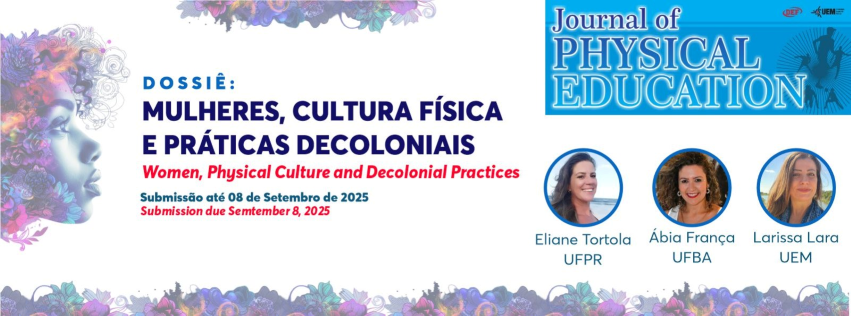Call for papers on "Women, decoloniality and physical culture"

Under the coordination of guest editors Dr. Eliane Tortola (UFPR), Dr. Ábia França (UFBA), and Dr. Larissa Lara (UEM), the Journal of Physical Education is accepting submissions for the thematic issue 'Women, Decoloniality, and Physical Culture.'
The growing trend in studies that problematize gender oppression, particularly concerning women in various manifestations of physical culture, has gained significant relevance in recent years. This trend has raised increasing concerns about the intersectionality of gender, social class, race/ethnicity, body, health, sports, and coloniality. Understanding how social markers of difference and coloniality intertwine in women's experiences within the context of physical culture is a necessary effort to deconstruct Eurocentric standards of performance, health, and beauty, as well as to challenge norms that marginalize diverse bodies deviating from socially imposed standards. As noted by Rita Segato (2012), in recent decades, there has been an increase in cruelty against women's bodies, particularly Black and Indigenous women and minorities who use certain bodily practices (such as capoeira, dance, gymnastics, among others) as forms of cultural and political resistance. In this context, physical culture is seen as a means of empowering the female body, which has historically been (and still is) controlled and objectified by patriarchal and colonial structures.
According to UN Women—an organization that publishes reports on the status of women and gender policies worldwide—despite 30 years having passed since the 4th World Conference on Women, held in Beijing in 1995 (an event that laid out a progressive and widely endorsed plan for women's and girls' rights globally), no country has yet achieved gender equality. Although some countries have made progress in policies that protect women's rights—such as anti-discrimination and gender violence laws in Canada and New Zealand, and laws to curb violence against women in Brazil (Law No. 11.340/2006 and Law No. 14.994/2024)—many daily struggles remain. While we observe a growing wave of feminist movements gaining momentum worldwide,particularly in Latin America, with initiatives such as Ni Una Menosin Argentina and the Marcha das Margaridas in Brazil, we simultaneously witness setbacks: the rise of the far-right, promoting narratives that depict women's rights movements as threats to traditional family values; the growth of religious fundamentalism, which harms women by restricting rights, opportunities, and bodily autonomy; the implementation of discriminatory policies aimed at mobilizing conservative electoral bases; and the brutal disregard for life resulting from male domination that perceives women as property.
We are currently witnessing the enactment of laws by conservative governments that restrict women's rights. These governments have adopted policies that limit access to abortion, healthcare (especially for transgender individuals), and participation in sports, as seen this year in the United States. These events reflect the impact of colonization on gender structures and women's rights across various regions of the world. As Maria Lugones (2014) reminds us, gender coloniality persists, manifesting at the intersection of gender, class, and race constructs, which are central to the global capitalist power system. The fight for women's rights today is, in many ways, a struggle against the legacy of colonialism and for the fair and equal redefinition of gender relations in all spheres of life.
Democratic access to physical culture—significantly impacted by colonization through the erasure of traditional bodily practices (dances, rituals, games, combat techniques, etc.) and the valorization of European sports—represents one of the pathways to resisting the coloniality of power. Changing this scenario requires education and awareness, the revalorization of traditional practices, the promotion of inclusion and diversity, and the development of accessible infrastructure for different populations. These efforts can contribute to creating a fair and inclusive environment for women's access to physical culture, challenging the colonial legacy.
The reflections proposed in this dossier aim to promote analyses of gender oppression, particularly the violence experienced by women in a patriarchal society shaped by coloniality. We hope to receive powerful, vibrant articles that contribute to academic debate and propose intervention strategies through projects and perspectives for overcoming the state of oppression and coloniality that affects women. In this regard, we encourage researchers from Brazilian and international institutions to collaborate academically by addressing various themes that critically contribute to the interrelation between women, physical culture, and decolonial practices.
We encourage submissions that analyze how women's relationships with their bodies are intrinsically linked to the struggle for territories and the defense of Indigenous, quilombola, riverine, Romani, nomadic, and peasant communities, as well as Indigenous peoples from various regions (such as Australian Aboriginals, the Māori of New Zealand, and the Sámi of Northern Europe). Topics exploring the growing intersection between decolonial practices, feminism, and ecology—with emphasis on the relationship between the body and the environment, as well as the importance of bodily practices and the recognition of the body as a site of resistance and transformation in political and ecological struggles—are highly welcomed.
Additionally, this Special Issue seeks articles discussing the formation of professionals who are critically aware of gender and coloniality issues and equipped to act inclusively and critically. This implies recognizing multiple femininities and reflecting on the construction of alternative masculinities, as the fight for gender equality is a shared responsibility aimed at dismantling patriarchal structures. We welcome studies that provoke reflections on research methodologies that engage the studied communities, valuing local knowledge and collaborative practices. We also accept manuscripts emphasizing life histories and personal narratives as a means of giving voice to women's experiences. Furthermore, we seek investigations analyzing the impact of the sociopolitical landscape on women's bodily practices, particularly in diaspora contexts (where local traditions merge with global influences).
In summary, the following themes guide the organization of this Special Issue:
a) Oppression, coloniality, and women's resistance: Impacts of patriarchy and coloniality on women; strategies and perspectives for overcoming oppression and coloniality in physical culture.
b) Representation and visibility of women in media and social networks: (In)visibility of women in sports media, especially Black and Indigenous women; social networks as decolonial and resistance spaces.
c) Professional training and critical approaches to gender and decoloniality: Development of training programs and inclusive, critical methodologies regarding gender and decoloniality.
d) Decolonial research methodologies focused on women: Participatory research methods that enhance women's critical engagement in overcoming gender coloniality and other forms of oppression within physical culture.
e) Decoloniality and sociopolitical impact on physical culture: Intersections between decolonial practices and sociopolitical contexts; the autonomy of Global South women and overcoming dependence on the Global North in physical culture.
f) Relationship between bodies, territories, and ecology: Connections between women's bodies and territorial and environmental struggles; intersections of decoloniality, feminism, and ecology; valuing traditional knowledge of quilombola, riverine, Romani, nomadic, and Indigenous women concerning care, health, and well-being.
g) Critique of hegemonic norms and inclusive alternatives: Questioning the medicalization and pathologization of cis and trans women's bodies; problematizing gendered and colonial practices that impose binary and exclusionary standards; promoting gender diversity and inclusion in physical education and physical culture.
h) Deconstructing hegemonic masculinity within the feminist movement: The participation of men in social movements, including feminism, as allies in promoting gender equality and recognizing their privileges to actively dismantle gender hierarchies.
The call can be read in Spanish here.








_1502.jpg)












